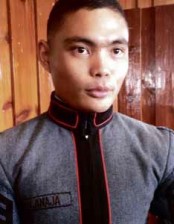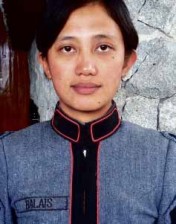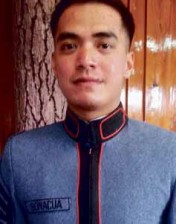FORT DEL PILAR, Baguio City—Long before Jestony Lanaja decided that life meant a career in the military, he earned his keep as a teenager by gathering sugarcane in a plantation in his hometown of Hagonoy in Davao del Sur that earned him P1.25 for each bundle he collected.
That early taste of the hard life—compounded by the possibility that soldiers like him could soon be facing challenges arising from controversies such as the conflicts over Sabah and disputed territories in the West Philippine Sea—will shape the insights Lanaja plans to bring when he graduates from the Philippine Military Academy (PMA) on March 17.
Cadet First Class Lanaja topped this year’s PMA graduating class of 124 cadets, which was named “Pudang Kalis,” an acronym for “Puso’t dangal ng mga kawal ng lahing nagkakaisa (The heart and soul of soldiers of a united race).”
Pudang Kalis also means “sacred sword.”
Members of the graduating class will receive their commission as officers of the Armed Forces of the Philippines from President Aquino on March 17 at Borromeo Field here.
Four female cadets are among the top 10 graduates, the first in many years since the PMA allowed women to join the academy in 1997.
Cadet First Class Maryam Balais, a Kankanaey from La Trinidad, Benguet, ranked second in the class.
A Muslim, Balais belongs to a family of law enforcers. Her brother Benjamin graduated valedictorian of the Philippine National Police Academy in 2006, while another brother, Dimas, belonged to the PMA Mandala Class of 2006.
Female cadets
Other female cadets among the topnotchers are Cadets First Class Joselyn Advincula of Tagaytay City, who ranked fifth; Vanessa Factor of Antipolo City, eighth; and Maila Maniscan of South Cotabato, 10th.
Three more female cadets will receive special citations: Cadet First Class Mariz Jane Ibarde is receiving the Chief of Staff Saber and the Tactics Group Award; Cadet First Class Jomelyn Bagsang will be cited for achievement in sports; and Cadet First Class Arianne Mae Gonzales is getting this year’s Journalism Award for serving as editor-in-chief of The Corps magazine.
Rounding up the top 10 list are Cadets First Class Prolen Bonacua of Valenzuela City, third; Jesse Nestor Saludo of Cavite, fourth; Leode John Tulang of Agusan del Sur, sixth; Mark Ferdinand Villamin of Batangas, seventh; and Jhed Dumocloy of Cagayan, ninth.
Lanaja is joining the Philippine Army, along with 66 other cadets (11 of them female), said Lt. Gen. Irineo Espino, PMA superintendent.
He said 24 other cadets are joining the Philippine Air Force, including three female cadets, while 33 others are joining the Philippine Navy, including Balais and four other female cadets.
Asked why she preferred the Navy, Balais said the world’s attention has shifted to the seas, where marine boundary feuds could require the service of the soldier.
Wounded cadet
One Pugad Kalis member won’t be joining the graduation. Cadet First Class Alfonso Aviles, who was shot and wounded when he tried to prevent an August 2012 jeepney robbery, had not completed the requirements needed to graduate, Espino said.
Aviles may not even be allowed to join the ceremonies by his doctors while he undergoes therapy for his wounds, Espino said.
He said the graduating cadets were aware of the political conflicts that had made the headlines—from the maritime dispute with China in the West Philippine Sea that began last year to the ongoing clashes in Sabah between Malaysian troops and armed men serving the sultanate of Sulu.
Last year, Espino said the PMA invited Foreign Secretary Albert del Rosario and Chinese Ambassador to the Philippines Ma Keqing to speak to the cadets.
“[The cadets raised] very interesting questions,” he said.
Pudang Kalis is also the first class to join a PMA stakeholders engagement program, which required them to live with communities in 16 villages of La Trinidad, Benguet, to understand their lives and the problems that they face each day, said Lt. Col. Jose Demar Pauly, PMA assistant chief of academy staff for civil military operations.
Espino said PMA training provided cadets the foundation for managing a crisis and they must learn to confront these problems at their own pace.
Balais said it was a task for which she was prepared. “My motivation comes from my mom. I would imagine myself wearing the uniform,” she said.
Flat broke
Cadets also learn to deal with problems they have confronted as children, Lanaja said.
“I stopped for one year [in high school]. Walang wala (We were broke). I would not force my family to keep me in school. I worked odd jobs instead,” he said.
“One of my first jobs was to harvest sugarcane [in a plantation owned by a company]… Working on the plantation meant we earned according to how many we were able to bundle. Each bundle, at least during my younger years, was P1.25. Older workers could collect up to a hundred bundles but since I was new in the game, all I could manage in a day was 50 bundles,” he said.
Lanaja said his parents, Antonio and Erlinda, were unemployed. But the hard life he experienced gave him the perspective he could use as a military officer, he said.
Because of scholarships, Lanaja finished high school and completed a full year enrolled in an electrical technology course when he took the PMA entrance examinations in 2008.
Aside from receiving the Presidential Saber, the PMA’s top academic award, he will also receive the Philippine Army Saber, the academic group award, plaques and citations for excellence in computing and information sciences and for the Army professional course, the Jusmag (Joint United States Military Assistance Group) Award, the General Antonio Luna Award and the Spanish Armed Forces Award.
Originally posted: 11:24 am | Monday, March 11th, 2013




